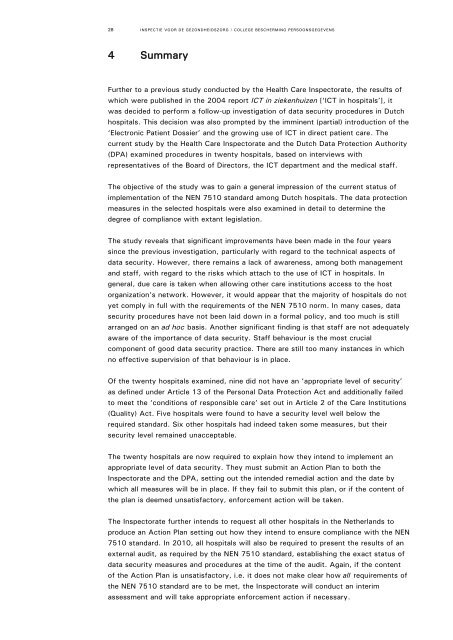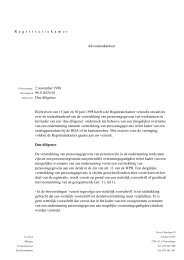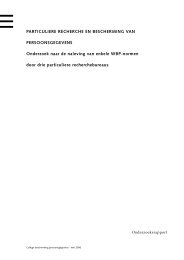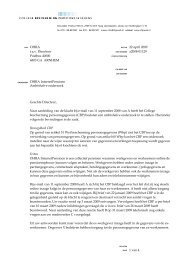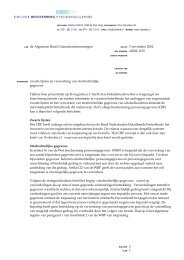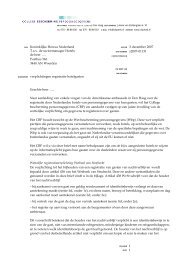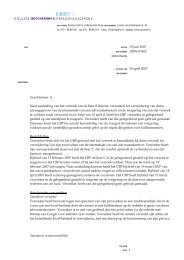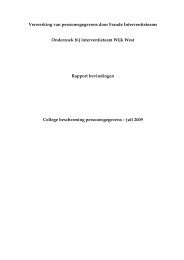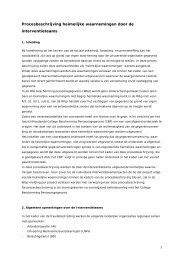Informatiebeveiliging in ziekenhuizen voldoet niet aan de norm
Informatiebeveiliging in ziekenhuizen voldoet niet aan de norm
Informatiebeveiliging in ziekenhuizen voldoet niet aan de norm
Create successful ePaper yourself
Turn your PDF publications into a flip-book with our unique Google optimized e-Paper software.
28 INSPECTIE VOOR DE GEZONDHEIDSZORG / COLLEGE BESCHERMING PERSOONSGEGEVENS<br />
4 Summary<br />
Further to a previous study conducted by the Health Care Inspectorate, the results of<br />
which were published <strong>in</strong> the 2004 report ICT <strong>in</strong> <strong>ziekenhuizen</strong> [‘ICT <strong>in</strong> hospitals’], it<br />
was <strong>de</strong>ci<strong>de</strong>d to perform a follow-up <strong>in</strong>vestigation of data security procedures <strong>in</strong> Dutch<br />
hospitals. This <strong>de</strong>cision was also prompted by the imm<strong>in</strong>ent (partial) <strong>in</strong>troduction of the<br />
‘Electronic Patient Dossier’ and the grow<strong>in</strong>g use of ICT <strong>in</strong> direct patient care. The<br />
current study by the Health Care Inspectorate and the Dutch Data Protection Authority<br />
(DPA) exam<strong>in</strong>ed procedures <strong>in</strong> twenty hospitals, based on <strong>in</strong>terviews with<br />
representatives of the Board of Directors, the ICT <strong>de</strong>partment and the medical staff.<br />
The objective of the study was to ga<strong>in</strong> a general impression of the current status of<br />
implementation of the NEN 7510 standard among Dutch hospitals. The data protection<br />
measures <strong>in</strong> the selected hospitals were also exam<strong>in</strong>ed <strong>in</strong> <strong>de</strong>tail to <strong>de</strong>term<strong>in</strong>e the<br />
<strong>de</strong>gree of compliance with extant legislation.<br />
The study reveals that significant improvements have been ma<strong>de</strong> <strong>in</strong> the four years<br />
s<strong>in</strong>ce the previous <strong>in</strong>vestigation, particularly with regard to the technical aspects of<br />
data security. However, there rema<strong>in</strong>s a lack of awareness, among both management<br />
and staff, with regard to the risks which attach to the use of ICT <strong>in</strong> hospitals. In<br />
general, due care is taken when allow<strong>in</strong>g other care <strong>in</strong>stitutions access to the host<br />
organization’s network. However, it would appear that the majority of hospitals do not<br />
yet comply <strong>in</strong> full with the requirements of the NEN 7510 <strong>norm</strong>. In many cases, data<br />
security procedures have not been laid down <strong>in</strong> a formal policy, and too much is still<br />
arranged on an ad hoc basis. Another significant f<strong>in</strong>d<strong>in</strong>g is that staff are not a<strong>de</strong>quately<br />
aware of the importance of data security. Staff behaviour is the most crucial<br />
component of good data security practice. There are still too many <strong>in</strong>stances <strong>in</strong> which<br />
no effective supervision of that behaviour is <strong>in</strong> place.<br />
Of the twenty hospitals exam<strong>in</strong>ed, n<strong>in</strong>e did not have an ‘appropriate level of security’<br />
as <strong>de</strong>f<strong>in</strong>ed un<strong>de</strong>r Article 13 of the Personal Data Protection Act and additionally failed<br />
to meet the ‘conditions of responsible care’ set out <strong>in</strong> Article 2 of the Care Institutions<br />
(Quality) Act. Five hospitals were found to have a security level well below the<br />
required standard. Six other hospitals had <strong>in</strong><strong>de</strong>ed taken some measures, but their<br />
security level rema<strong>in</strong>ed unacceptable.<br />
The twenty hospitals are now required to expla<strong>in</strong> how they <strong>in</strong>tend to implement an<br />
appropriate level of data security. They must submit an Action Plan to both the<br />
Inspectorate and the DPA, sett<strong>in</strong>g out the <strong>in</strong>ten<strong>de</strong>d remedial action and the date by<br />
which all measures will be <strong>in</strong> place. If they fail to submit this plan, or if the content of<br />
the plan is <strong>de</strong>emed unsatisfactory, enforcement action will be taken.<br />
The Inspectorate further <strong>in</strong>tends to request all other hospitals <strong>in</strong> the Netherlands to<br />
produce an Action Plan sett<strong>in</strong>g out how they <strong>in</strong>tend to ensure compliance with the NEN<br />
7510 standard. In 2010, all hospitals will also be required to present the results of an<br />
external audit, as required by the NEN 7510 standard, establish<strong>in</strong>g the exact status of<br />
data security measures and procedures at the time of the audit. Aga<strong>in</strong>, if the content<br />
of the Action Plan is unsatisfactory, i.e. it does not make clear how all requirements of<br />
the NEN 7510 standard are to be met, the Inspectorate will conduct an <strong>in</strong>terim<br />
assessment and will take appropriate enforcement action if necessary.


